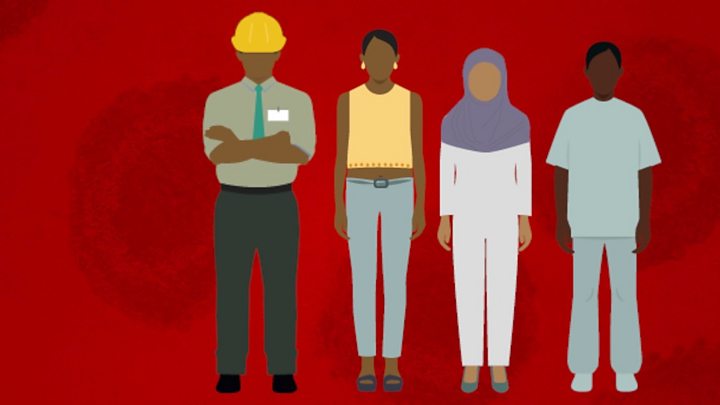 Image copyright Getty Images
Image copyright Getty Images
UK scientists are to receive millions of pounds of government funding for a raft of studies to learn why ethnic minorities are at greater risk from Covid-19.
Six projects will analyse data on social circumstances, health and day-to-day activities, as well as investigating genetic risk factors.
One will follow 30,000 health and social-care staff for a year.
Researchers say there will be rapid action based on the findings.
Prof Kamlesh Khunti, director of the Centre for BME Health at Leicester University, who is involved in three of the studies, told BBC News he expected results to be translated into guidance that would help save black, Asian and minority ethnic (BAME) lives within months.
"We will definitely get answers to the things that are putting people at much higher risk," he said. "As soon as we get results that might make a difference, it is important that we get them out straight away."
The results will also be shared with the leaders of black and South Asian communities, professional bodies and health regulators who will take rapid action, said Prof Khunti.
"If we find that living in crowded, multi-generational housing, not getting enough physical activity, are high on the list of factors associated with certain communities dying from Covid, we can look at the evidence and transform them into the most culturally appropriate messages."

Emerging evidence shows people from ethnic minorities are significantly more likely to die from Covid-19 than the white population.
But no-one knows exactly why ethnic groups are more vulnerable, though there are a number of ideas about why people from BAME backgrounds have been harder hit.
These include:
- working in occupations with greater levels of contact with people in frontline health and social care
- living in deprived circumstances
- a greater proportion having underlying health conditions, such as diabetes and hypertension, which increase the risk of serious illness
Prof Chris Whitty, the UK's chief medical adviser, welcomed the research.
"With evidence showing that people from BAME backgrounds are more severely affected by Covid-19, it is critical that we understand what factors are driving this risk to address them effectively," he said.
"The diverse range of projects funded will help examine this association in detail so that new treatments and approaches to care can be developed to target BAME groups."
The projects include:
- a study looking at age, gender and deprivation data on more than two million health and social-care workers. The study will also follow 30,000 doctors, nurses, porters and cleaners of all ethnic backgrounds over the course of a year and look at workplace routines, such as redeployments and the provision of protective equipment
- Oxford and Southampton University teams will look at the health conditions of BAME patients who were treated in hospital and died from Covid-19, using a database of 40 million GP records across England
- a project analysing information gathered by the UK Biobank project, which has been monitoring the genetics, mental wellbeing and physical activity of 500,000 people since 2006 and collects blood, urine and saliva samples.
Dr Manish Pareek, an associate clinical professor at the University of Leicester, is leading the study of health and social-care workers.
He says the aim is to quantify the risk for different groups.
"What is the risk of a doctor from an Asian group compared with that of a nurse of black ethnicity?
"If there is a clear signal we are seeing that a particular group is at high risk we will put these forward and recommend action be taken. This may include enhanced health assessments or that those at really high risk should not be working in Covid wards."
He added: "Even taking into account factors such as deprivation, household structure, age and gender, ethnicity is still is an important predictor of getting infected and having adverse outcomes."
Prof Dame Ottoline Leyser, chief executive of the UK Research and Innovation agency, which has part-funded the research, along with the National Institute of Health Research, said the studies would lead to lives being saved.
"Urgent action must be taken to determine and address the factors underlying this disparity," she said.
"There is unlikely to be a simple answer and we must consider all possibilities, including the role of racial and social inequalities, so that we can save as many lives as possible during this pandemic and any future outbreaks."
from Via PakapNews